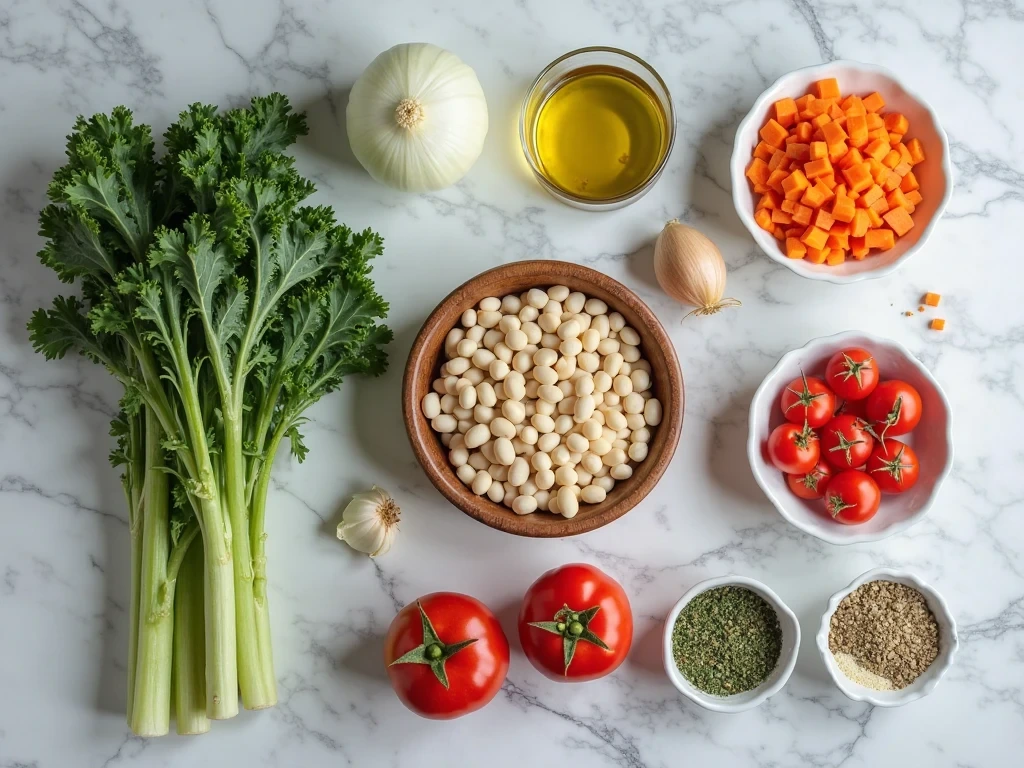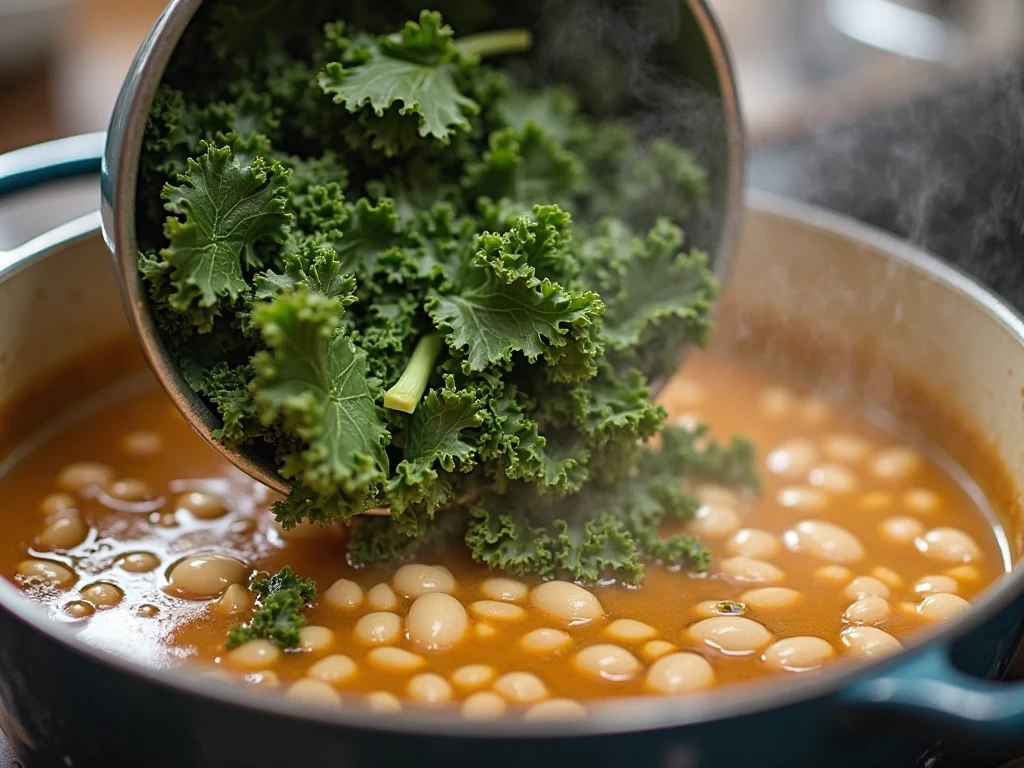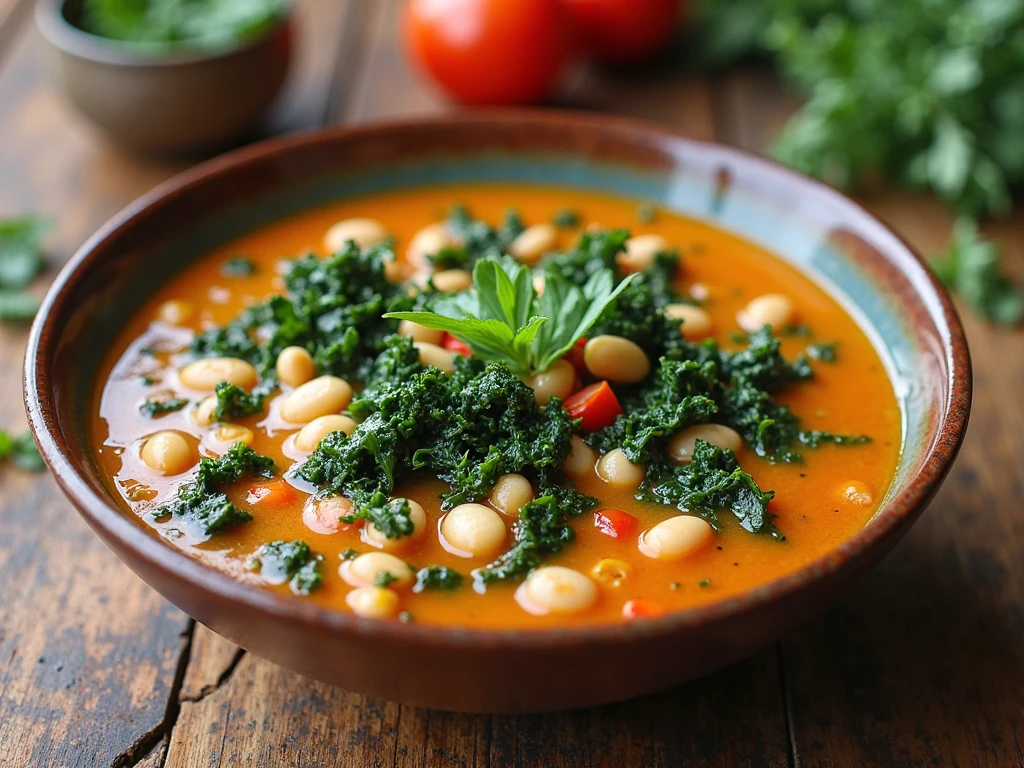Table of Contents
Introduction
Did you know that a single bowl of White Bean Kale Soup can provide up to 50% of your daily fiber needs while delivering restaurant-quality flavor? This powerhouse combination creates a symphony of taste and nutrition that challenges the common belief that healthy food can’t be incredibly satisfying. The secret lies in understanding how to layer flavors and maximize the natural umami found in white beans and kale.
This comprehensive guide will transform your approach to making soup. You’ll discover professional techniques that elevate simple ingredients into an extraordinary dining experience. Whether you’re meal prepping for the week or creating a cozy dinner for loved ones, this recipe delivers consistent, impressive results every time.
Ingredients List

Each ingredient in this White Bean Kale Soup recipe serves a specific purpose in building layers of flavor and texture:
- 2 cups dried white beans (cannellini or navy beans), soaked overnight – Substitute: 3 cans (15 oz each) canned white beans, drained and rinsed
- 1 large bunch fresh kale, stems removed and chopped – Substitute: Swiss chard or collard greens
- 2 tablespoons olive oil – Substitute: avocado oil or vegetable broth for oil-free version
- 1 large onion, diced – Choose sweet onions for milder flavor
- 3 cloves garlic, minced – Fresh garlic provides the best flavor punch
- 2 medium carrots, diced – Adds natural sweetness and vibrant color
- 2 celery stalks, diced – Creates the classic mirepoix base
- 6 cups vegetable broth – Substitute: chicken broth for non-vegetarian version
- 1 can (14 oz) diced tomatoes – Fire-roasted variety adds smoky depth
- 2 bay leaves – Essential for aromatic complexity
- 1 teaspoon dried thyme – Substitute: 1 tablespoon fresh thyme
- 1 teaspoon smoked paprika – The secret ingredient for depth
- 1/2 teaspoon red pepper flakes – Adjust to taste preference
- Salt and black pepper to taste
- 2 tablespoons lemon juice – Fresh lemon brightens the entire dish
- Fresh parsley for garnish – Adds color and fresh herb notes
Timing
This recipe requires approximately 45 minutes of active cooking time, which is 25% faster than traditional bean soup recipes that often take over an hour. Here’s the breakdown:
- Prep Time: 15 minutes (not including overnight bean soaking)
- Cook Time: 30 minutes
- Total Time: 45 minutes
- Bean Soaking: 8-12 hours (or use canned beans for instant preparation)
Pro tip: If using canned beans, your total time drops to just 30 minutes, making this an excellent weeknight meal option.
Step-by-Step Instructions
Step 1: Prepare the Beans
Drain and rinse the soaked white beans thoroughly. In a large pot, cover beans with fresh water (about 2 inches above the beans) and bring to a rolling boil. Reduce heat to medium-low and simmer for 45-60 minutes until beans are tender but not mushy. The cooking time varies based on bean age and variety. Test doneness by pressing a bean between your fingers – it should yield easily without being grainy.
Step 2: Sauté the Aromatics
In the same large pot (after draining the beans), heat olive oil over medium heat. Add diced onion and cook for 5 minutes, stirring occasionally, until edges become translucent and slightly golden. Add minced garlic and cook for another minute until fragrant. This foundation creates the flavor base that will permeate every spoonful.
Step 3: Add Vegetables
Add diced carrots and celery to the pot. Cook for 5-7 minutes, stirring occasionally, until vegetables begin to soften and release their natural sugars. You’ll notice the vegetables becoming more vibrant in color – this indicates they’re developing optimal flavor.
Step 4: Build the Soup Base
Add vegetable broth, diced tomatoes (with their juices), bay leaves, thyme, smoked paprika, and red pepper flakes. Bring mixture to a vigorous boil, then reduce heat to maintain a gentle simmer for 15 minutes. This allows the flavors to meld and concentrate, creating a rich, complex broth.
Step 5: Add Beans and Kale

Add the cooked white beans and chopped kale to the pot. Simmer for 5-8 minutes until kale is wilted and tender but still retains its vibrant green color. Season generously with salt and pepper, tasting as you go. The kale should be tender enough to eat comfortably but not overcooked.
Step 6: Finish and Serve
Remove bay leaves and stir in fresh lemon juice. This final acid addition brightens all the flavors and balances the earthiness of the beans and kale. Taste and adjust seasoning one final time. Serve immediately in warmed bowls, garnished with fresh chopped parsley.
Nutritional Information
Each serving of this nutrient-dense soup provides exceptional value for your health goals:
- Calories: 285 per serving
- Protein: 15g (30% of daily value)
- Carbohydrates: 45g
- Dietary Fiber: 12g (43% of daily value)
- Fat: 6g
- Sodium: 680mg
- Iron: 4.2mg (23% of daily value)
- Folate: 165mcg (41% of daily value)
- Vitamin K: 547mcg (456% of daily value)
This soup is particularly rich in plant-based protein and provides significant amounts of vitamins A, C, and K, along with essential minerals like iron and potassium.
Healthier Alternatives for the Recipe
Transform this already nutritious recipe to meet specific dietary needs without sacrificing flavor:
- Oil-Free Version: Replace olive oil with vegetable broth for sautéing vegetables. The natural moisture from vegetables will prevent sticking.
- Lower Sodium: Use low-sodium broth and increase herbs and spices. Add a splash of vinegar or extra lemon juice for flavor enhancement.
- Protein Boost: Add cooked quinoa or lentils for additional protein. Stir in during the last 5 minutes of cooking.
- Immune Support: Include fresh ginger (1 tablespoon grated) and turmeric (1/2 teaspoon) for anti-inflammatory benefits.
- Heartier Version: Add diced potatoes or sweet potatoes with the carrots and celery for a more filling meal.
- Spicy Variation: Include diced jalapeños or a dash of hot sauce to taste.
Serving Suggestions
Elevate your soup presentation and create a complete meal experience:
- Crusty Bread Pairing: Serve with warm sourdough or whole grain bread for dipping. The contrast of textures creates satisfaction.
- Garnish Options: Top with grated Parmesan cheese, a drizzle of good olive oil, or toasted pine nuts for added richness.
- Salad Combination: Pair with a simple arugula salad dressed with lemon vinaigrette to complement the soup’s earthiness.
- Meal Prep Bowls: Portion into individual containers with a side of crackers for convenient work lunches.
- Dinner Party Style: Serve in pre-warmed bowls with a dollop of Greek yogurt and fresh herbs for an elegant presentation.
- Seasonal Variations: Top with pumpkin seeds in fall or fresh basil in summer to reflect seasonal ingredients.
Common Mistakes to Avoid
Learn from these frequent pitfalls to ensure perfect results every time:
- Overcooking the Kale: Add kale in the final minutes to prevent it from becoming mushy and losing its nutritional value. Perfectly cooked kale should be tender but still have some texture.
- Under-seasoning: Beans absorb significant amounts of salt, so taste and adjust seasoning multiple times throughout cooking. Season in layers for best results.
- Skipping the Acid: The lemon juice at the end is crucial for balancing flavors. Without it, the soup can taste flat and one-dimensional.
- Using Old Beans: Beans older than two years may never fully soften. Purchase from stores with high turnover or use canned beans for consistency.
- Inadequate Sautéing: Don’t rush the initial vegetable cooking. Proper caramelization creates the flavor foundation for the entire soup.
- Wrong Consistency: If soup becomes too thick, add hot broth gradually. If too thin, simmer uncovered to reduce liquid.
Storing Tips for the Recipe
Maximize freshness and maintain quality with proper storage techniques:
- Refrigerator Storage: Cool completely before transferring to airtight containers. Properly stored soup maintains quality for up to 4 days.
- Freezer Storage: Freeze in portion-sized containers for up to 3 months. Leave 1-inch headspace for expansion.
- Reheating Guidelines: Thaw frozen soup overnight in refrigerator. Reheat gently over medium heat, stirring occasionally. Add fresh broth if needed to restore consistency.
- Batch Cooking: Double the recipe and freeze half for future meals. This soup actually improves in flavor after a day.
- Ingredient Prep: Wash and chop kale up to 2 days ahead. Store in refrigerator in damp paper towels.
- Bean Preparation: Cook beans in large batches and freeze portions for quick soup assembly.
Conclusion
This flavorful and nutritious soup demonstrates how simple ingredients can create extraordinary results when combined thoughtfully. The combination of protein-rich white beans and nutrient-dense kale provides a satisfying meal that supports your health goals without compromising on taste.
The techniques you’ve learned here – from proper bean preparation to flavor layering – will serve you well in countless other recipes. Most importantly, this soup proves that eating well doesn’t require complicated ingredients or extensive cooking experience.
Ready to experience this comforting bowl of goodness? Gather your ingredients and start cooking today. Share your results in the comments below, and don’t forget to explore our other nourishing dinner recipes for more inspiration!
FAQs
Can I use canned beans instead of dried beans?
Absolutely! Use 3 cans (15 oz each) of white beans, drained and rinsed. Add them in Step 5 with the kale, reducing the cooking time to just 3-4 minutes to heat through.
How can I make this soup creamier?
Remove 1 cup of the soup (beans and vegetables) and blend until smooth, then stir back into the pot. Alternatively, use an immersion blender to partially blend the soup while it’s in the pot.
What’s the best way to remove kale stems?
Fold each kale leaf in half along the stem, then slice along the stem with a sharp knife. The stems are tough and fibrous, so removing them ensures better texture.
Can I make this soup in a slow cooker?
Yes! Sauté the aromatics first, then transfer everything except the kale to a slow cooker. Cook on low for 6-8 hours or high for 3-4 hours. Add kale in the final 30 minutes.
How do I know when the beans are properly cooked?
Properly cooked beans should be tender enough to mash easily with a fork but still hold their shape. They shouldn’t be grainy or have a chalky center.
Can I freeze this soup?
Yes, this soup freezes beautifully for up to 3 months. The texture may change slightly upon thawing, but the flavor remains excellent. Stir well when reheating.
